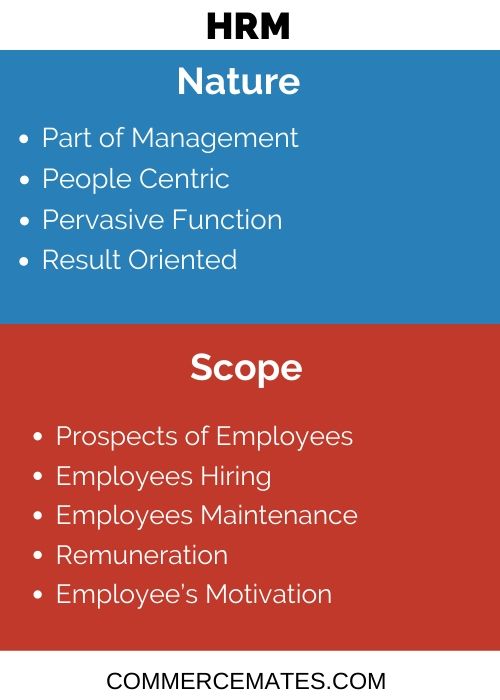Contents
Meaning of Human Resource Management (HRM)
Human resource management refers to management of employees working within the organization. It is part of management which aims at maintaining efficient and competent workforce. Human resource management involves wide range of activities such as hiring, training, motivating, fixing compensation, promoting and firing employees.
This is a continuous function which focuses on planning, organizing, directing and controlling of human resource. HRM is a process which enables in enhancing the performance of employees and derives better results from them. It ensures fuller utilization of employees working in an organization to attain desired goals timely.
Human resource management helps organizations in deciding the optimum number of human resource required and also recognizes the sources for recruiting them. It aims at matching right person to right job at right time to derive maximum output. Human resource management is one of the important managerial functions required by every organization to remain profitable and productive.
Nature of Human Resource Management (HRM)
Part of Management
HRM is a component of management but not a separate discipline in itself. It is concerned with managing the human resources for deriving better efficiency using principles and techniques of management.
People Centric
It is people-oriented as all activities of HRM revolve around the people working with organization. HRM involves monitoring the activities of all peoples working at different role or positions within organization from top to bottom.
Pervasive Function
HRM is a pervasive function needed for all organization at different levels for proper management of employees. It is not specific to any one type of business or department but is practiced at all levels of management.
Result Oriented
This function focuses on achievement of desired targets of organization by deriving better output from employees. It pays more attention on actions instead of maintaining records or following rules.
Continuous Process
HRM is a continuous and ongoing process which needs to be practiced as long as the business operates. It is not a short-term function but is required continuously for managing day-to-day operations and for bringing the required changes timely.
Integrating Mechanism
It aims at integration of capital and workforce in the best possible manner to derive the maximum output. HRM is the one which strengthens the relations among peoples working at various levels for attaining desired goals.
Comprehensive Function
HRM is comprehensive in nature as it is applicable to all types of employees of organization. It encompasses all peoples such as supervisors, managers, officers, workers and rests all working therein.

Scope of HRM
Prospects of Employees
Human resource management is concerned with planning adequate no. of manpower requirements. It evaluates various job positions within the organizations and defines the skills required for such positions.
Employees Hiring
It involves selecting the right employees for carrying out the required operations. On the basis of information collected by analyzing the job positions, it does the function of designing and performing the whole recruitment process of organization.
Employees Maintenance
It aims at proper maintenance of employees by providing them required training and a proper working environment. Newly recruited personnel’s are trained in accordance with organization needs for acquiring the objectives.
Remuneration
HRM ensures that all employees are paid fair remuneration as per their skills and performance level. It examines the output of each employee which helps in deciding their incentives, salaries, increments and promotions.
Employee’s Motivation
Motivating employees for better performance from time to time is another key role played by HRM. It motivates them by rewarding as per their efficiency and also taking care of their welfare facilities. Providing various monetary and non-monetary benefits helps in boosting the morale of employees towards their roles.
Industrial Relations
Proper cordial relation with union members is must for ensuring continuity of business activities. HRM maintains good relationship with labors by fulfilling all of their needs timely. It resolves all conflicts arising within enterprise and prevents labor strikes.